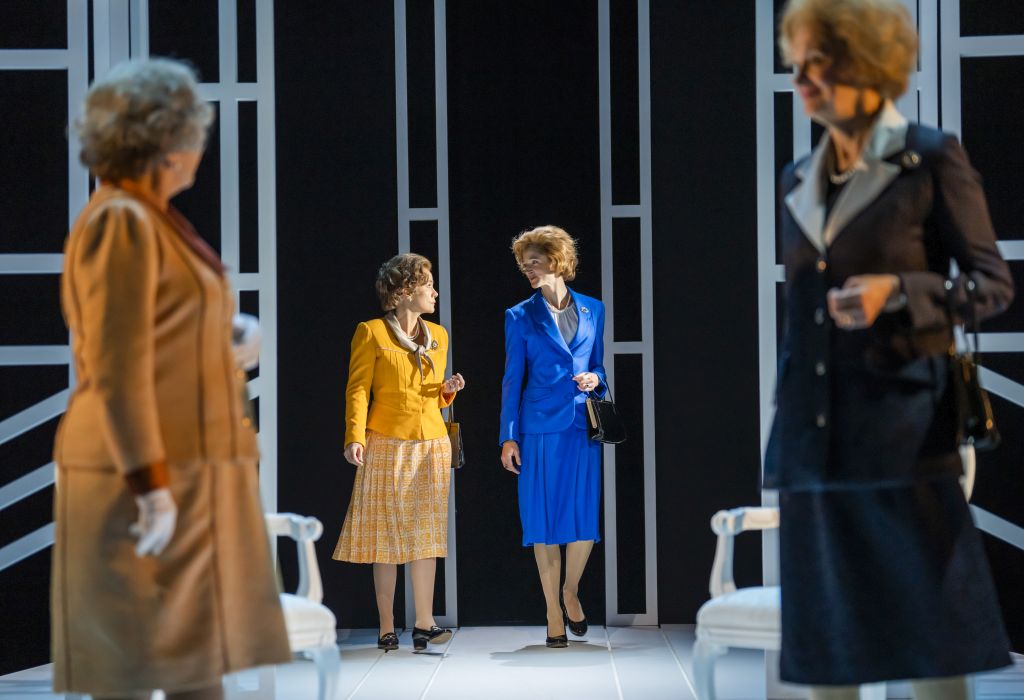It’s only nine years since Moira Buffini’s Handbagged had its premiere at Kilburn’s Tricycle theatre (renamed the Kiln in 2018), but it triumphantly returns to the same venue as a copper-bottomed classic. Its timing is uncanny: Margaret Thatcher was dying the year it made its debut; now it resurfaces just as its other protagonist, HM the Queen, has passed away.
Here they are again, handbags at the ready (black patent for the younger and older Thatchers, what looks like a black Launer for the two versions of the Queen), as they square up to slug it out in telling the story of their 11 years of weekly audiences and what was happening in the background.  No recording of these chats exists, but Buffini hasn’t just fancifully imagined what the two women said. Chunks of Thatcher interviews and quotes from the Queen’s self-penned Christmas speeches are seamed through the piece. Q (Marion Bailey, reprising her role from the original production) and T (Kate Fahy), the older versions, form an elderly chorus, sporadically interrupting to deny saying things their younger selves, Mags (Naomi Frederick) and Liz (Abigail Cruttenden), have just said. Their protestations are more like non-denial denials.
No recording of these chats exists, but Buffini hasn’t just fancifully imagined what the two women said. Chunks of Thatcher interviews and quotes from the Queen’s self-penned Christmas speeches are seamed through the piece. Q (Marion Bailey, reprising her role from the original production) and T (Kate Fahy), the older versions, form an elderly chorus, sporadically interrupting to deny saying things their younger selves, Mags (Naomi Frederick) and Liz (Abigail Cruttenden), have just said. Their protestations are more like non-denial denials.
Those 11 years were the first time both the UK’s two highest roles of state were occupied by women, though who was running the show is the crux of the piece. Its meta intentions are revealed when the four characters start literally trying to run the show, querying the writer’s decisions on what to cover and what to omit, refusing to continue until a key event like the 1981 riots is discussed, haggling over whether there will be an interval. Meanwhile, two male actors (Richard Cant and Romayne Andrews, both splendidly funny, especially Cant’s hair-flicking Michael Heseltine and Andrews’ slinky Nancy Reagan), pick up all the other roles, and also get to play themselves discussing the play.
We will never know what the Queen thought in her heart of hearts, but in Q Buffini has created a character who probably resembles what we hoped HM was like: a slightly left-leaning realist, quick of mind and strong in scruples. This is a woman who introduced Christian solicitude for the poor and oppressed into her Christmas messages. Mags is appalled when Liz goes off-message like this, bemoaning child poverty in the UK as well as the inequality between the UK and the Commonwealth — Mags sees the latter as “a collection of nations run by communists and mendicants”. And when Liz uses the word “comradeship”, Mags, T and Denis shriek in terror at this royal red-under-the-bed.
Part of the comedy in this very funny play stems from the idea that the women have no concept of how theatre works; Mags is puzzled that the same actor can play both her husband Denis and Peter Carrington, though Q at least can make a joke about the room they’re in having three walls. But she admits she only liked War Horse for the horses.
What becomes clear is that both women inhabit wholly separate worlds, Q/Liz in a realm of trips around the Commonwealth in the royal yacht, T/Mags in the Westminster bubble. Thatcher wants to close the mines; the Queen has been down one and feels sympathy for the miners. They speak at cross purposes about “service”, which Q sees as her duty, T as the tea set they are using: “Are they Spode?” They can’t even find common ground in their pets, though they do have a momentary bonding over scones and jam after the Brighton bombing and again in 1991 as T leaves No 10 and Q girds her loins for her annus horribilis.
The focus of the piece is Mrs Thatcher’s record as prime minister, but inevitably the Queen will be of more interest to today’s audiences. The monarch who emerges from this piece, despite its knockabout tone, is pretty much the one that five-mile queues have been forming to show their respects to: a wise woman, witty, wary, businesslike, no intellectual but more knowledgeable about the world than Thatcher (though probably fonder of playacting than Buffini allows).
To really knock this piece into the park you need an exceptional cast, which director Indhu Rubasingham has. Bailey is a peerless Q, part old biddy, part shrewd operator, a twinkle in her eye and the trademark sensible shoes on her feet. Cruttenden’s Liz is less wily, a clear-minded woman with an obviously sincere concern for others.
The two actresses playing Thatcher have the juicier task. Both Fahy and Frederick have nailed her stance and vocal tics, her strange way of stressing a first syllable accompanied by a throaty whoosh — at one point on press night, when she couldn’t locate a prop in her handbag, Frederick even ad-libbed as Mags, to rousing cheers.
To dispel the funereal sobriety that has seeped into our daily life, this revival is a total tonic, a perfect example of how to address a serious subject with a comic impulse. Go along and have your own kind of audience with our late Queen.















Add comment